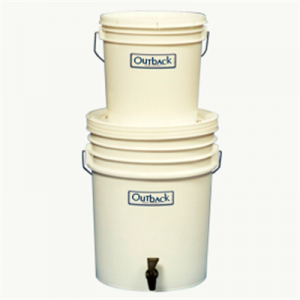Boil water alert!
The minute water mains break anywhere, the water coming into your home stands the chance of being contaminated. And mains break regularly. I did a quick search online and found multiple Boil Water Alerts listed over just a short two-week period – in locales as different as Portland (OR), New Brunswick (NJ) and Tampa (FL).
What are your sources of water in an emergency?
If you heard a Boil Water Alert, what sources of clean water would you turn to?
It goes without saying that water in bottles or properly-treated water from barrels would be your first choice. You wouldn’t even have to boil that water.
Rain water could also be a source if you could capture it directly from the sky.
But I’ve been asked . . .
What about using water from a swimming pool?
I’m not a chemist or a health worker, so I recommend you do your own research on this topic. But this is what I have found out that seems to make sense.
Do not plan to use swimming pool water to drink or cook unless you are able to treat it.
In a long-term water outage, here are some guidelines:
- Pool water could be used as is to wash feet and body; murky is better than nothing!
- Do you have sunshine? Letting pool water sit in sunlight for a full day will cause chlorine to dissipate and the sun’s UV rays will kill organisms. At the end of its sunshine treatment that water will be cleaner than when you started.
- Filter water (through layers of clean cloth) then boil it (one full minute after it reaches a rolling boil) for drinking and cooking. (Boiling will kill bacteria and viruses. Chemicals and metals would not be removed.)
Only a commercial filter will remove all contaminants.
I asked the LifeStraw people specifically about swimming pool water, and they said that LifeStraw was NOT meant to handle pool water.
Then I went further, seeking out an expert in one of my LinkedIn groups. Here’s info I got from Bob Hess of Tealbrook Supplies. The Outback portable filter is typically used in regions where there is no piped water supply. You pour water into the top bucket, it goes through four different filters, producing 100 gallons of pure water a day. This model costs less than $200. You can see more at www.tealbrook.com.
So in conclusion — yes, pool water may be useful for SOME things, but converting it to safe, pure water will take effort.
All this reinforces ongoing Emergency Plan Guide message – the most important item you can store for emergencies is water. The recommended amount: 1 gallon per person per day (plus more for pets) for at least 10 days!
Virginia
Your Emergency Plan Guide team
P.S. Do you have more information about the topic of using pool water in an emergency? Please share it by leaving a comment below!
Don't miss a single Advisory.
Thank you for subscribing.
Something went wrong.

